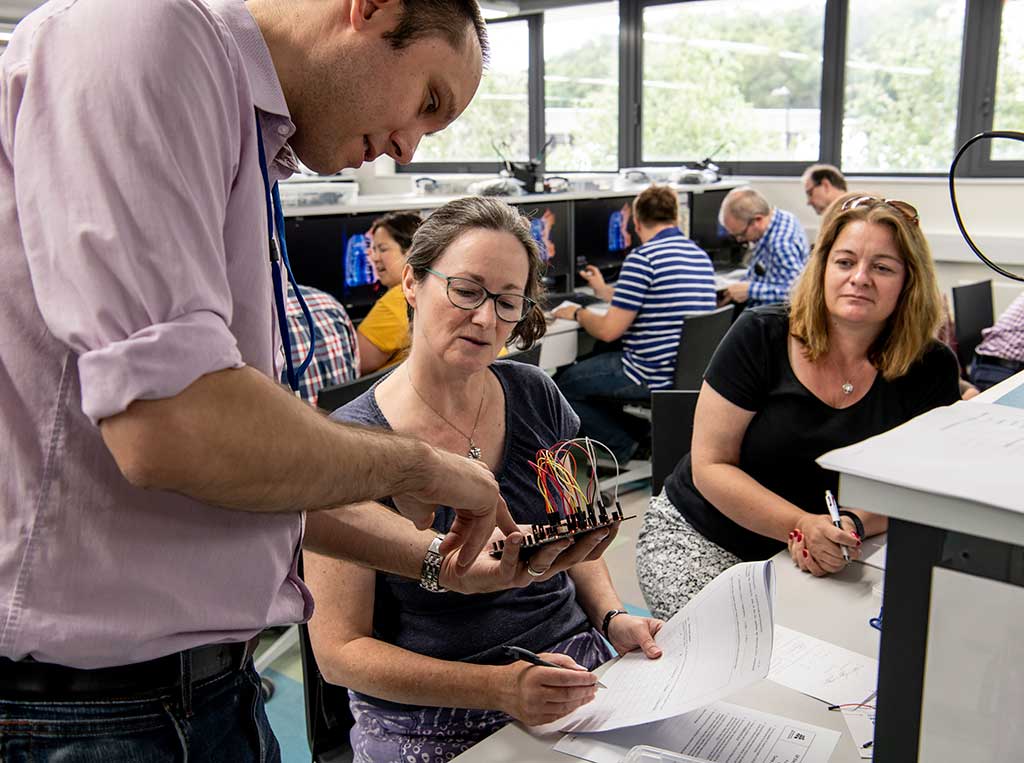Electronic Engineering A-Level Teaching Kits
In 2014, I founded a project to try and set about raising the profile of electronic engineering to students across the UK and beyond, sparking interest in engineering as a discipline. There is a growing shortage of skilled electronic and electrical engineers in the UK, and external factors (the discontinuation of A-Level electronics, national promotion of computer science, etc) are further exacerbating this.
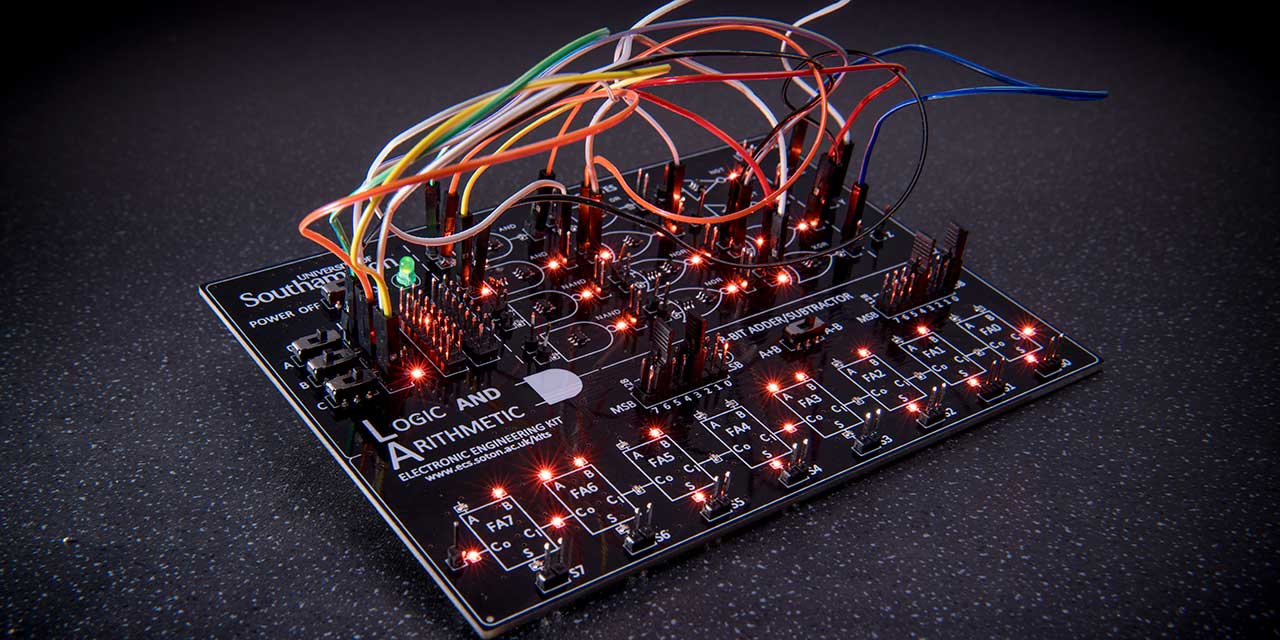
Rather than focus on extra-curricular activities, shown to often have limited success, I decided to focus on improving the teaching of aspects of electronic engineering which feature in other popular A-Level subjects, namely A-Level Physics and Computer Science. Two colleagues (Dr Alex Weddell and Dr Daniel Spencer) and I joined forces with the UK Electronics Skills Foundation (UKESF) to design, fundraise, manufacture and distribute innovative educational kits, and run hands-on training courses. We aimed to provide more engaging material and further supporting teachers - especially those that who may not feel particularly comfortable with, or enthused by, the topics themselves.
We created two kits: one supporting A-Level Physics (led by my colleague Dr Daniel Spencer) and the other supporting A-Level Computer Science (which I led). The team received a Vice Chancellor's Award for Public Engagement and Outreach in 2019 for their work on the project.
"Logic and Arithmetic" Kit
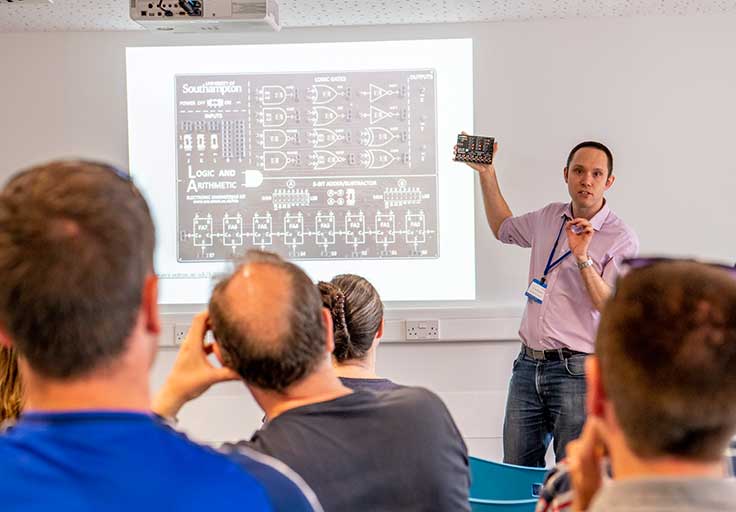
For A-Level Computer Science students, we developed a "Logic and Arithmetic" kit, which incorporates core electronics concepts in the computer science syllabi. In particular, it covers aspects of Boolean operations, logic gates and base 2 (binary) number systems. The kit is split into two sections: 'Logic' and 'Arithmetic', with Light Emitting Diodes (LEDs) used to indicate logic states throughout.
The logic section can be used to explore Boolean operations and logic gates, and to implement simple logic functions and circuits. The board has three switchable logic inputs, a range of different logic gates (AND, OR, NAND, NOR, XOR, NOT), and three logic outputs. Orange LEDs indicate the state (logic 0 or 1) of the individual inputs and outputs of every gate. The arithmetic section provides an 8-bit two's complement adder/subtractor circuit, offering the ability to perform A+B or A-B (where A and B are 8-bit binary numbers). This can be used to experiment with unsigned and signed binary arithmetic, as well as offering a different way to observe and understand binary number systems. This can even be extended to a 9-bit adder circuit, by using the Logic Section of the kit to implement a Full Adder.
"Music Mixer" Kit
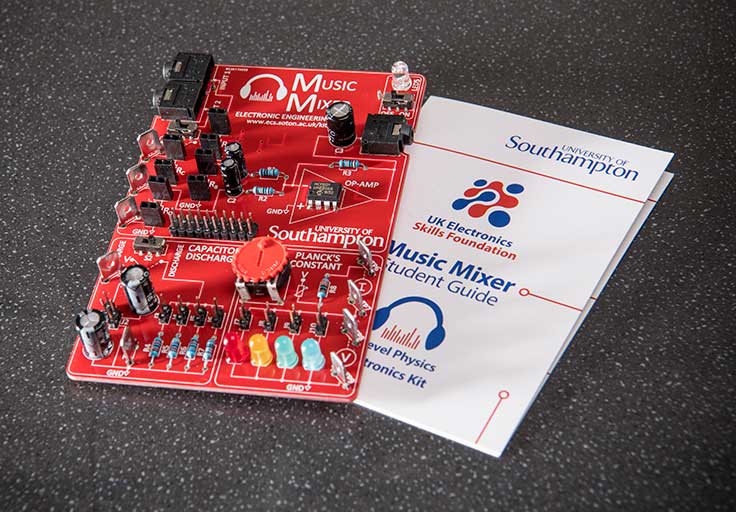
For A-Level Physics students, we developed a "Music Mixer" kit, which incorporates core electronics concepts in the physics syllabi. The music mixer circuit combines two audio signals, for example music from mobile phones, enabling users to control the volume by experimenting with different electronic components, learn about electronic sensors (e.g. LDRs) and resistor dividers. The design aims to expose all components and demystifies electronics for students.
The music mixer introduces potential dividers using an audio mixer circuit. The board has two audio input channels that are mixed together using an amplifier. The volumes of the two channels are controlled by potential dividers where the resistor values can be changed or exchanged with LDRs, or other resistive elements, to control the level of each channel.
The board also has dedicated sections for determining Planck's constant - by measuring and plotting the voltage and current through four differently coloured LEDs - and experimenting with series and parallel capacitor discharge through different value resistors.
Distribution and Teacher CPD
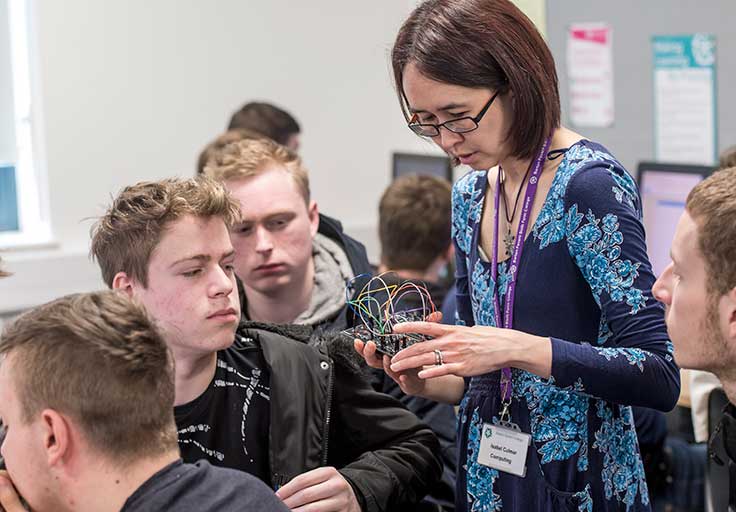
In 2017 and 2018, we raised a total of £63k from industry and charities, enabling the manufacture of over 2,700 classroom sets, which have been distributed to 170 schools and colleges around the UK (with geographic reach far from Southampton, e.g. Jersey, Wales, Cumbria, and one set even going to Poland). These classroom sets have the potential to reach >10,000 new students each year (assuming each is used with 2x classes of 30 students per year). Partnering with an excellent national charity (of which I am on the strategic advisory board), the UKESF, enabled us to acheive much greater reach, fundraising, and impact.
We created a range of additional training material, including user guides, training exercises, student-led tutorial videos, and online training sessions. The kits and accompanying resources were used to provide face-to-face continued professional development (CPD) activities on-campus to train teachers (led by my colleague Dr Alex Weddell). Funding was also used to address the gender-imbalance in electronics, specifically targeting twelve single-sex girl's colleges by providing CPD activities and classroom sets of the kits.
"It made a dry, but very useful, topic come to life."
At the end of 2018, Dr Merrett and the UKESF launched the "Electronics Everywhere" campaign at the annual TechWorks Industry Summit, aiming for every school in the UK which offers A-Level Physics and/or Computer Science (currently ~4,000 schools) to have a classroom set of the kit(s) by 2022. The team have continued to pitch to investors and are hoping to attract further donations from industry and charities this summer, enabling them to provide donations of the kits to more schools and colleges across the country. The team have also recently gained the endorsement of the Royal Academy of Engineering, and are now working together to promote the campaign via their Connecting STEM Teachers programme and using their Teacher Coordinators to improve learning resources.
As of January 2025, 860 schools have received classroom sets through the campaign, reaching tens of thousands of students.
ECS Summer Taster Courses
From 2014-22, I founded, managed and led ECS' popular and well received programme of residential summer schools for A-Level students, which was a 2017 finalist for a Vice Chancellor's Award for collegiality in outreach.
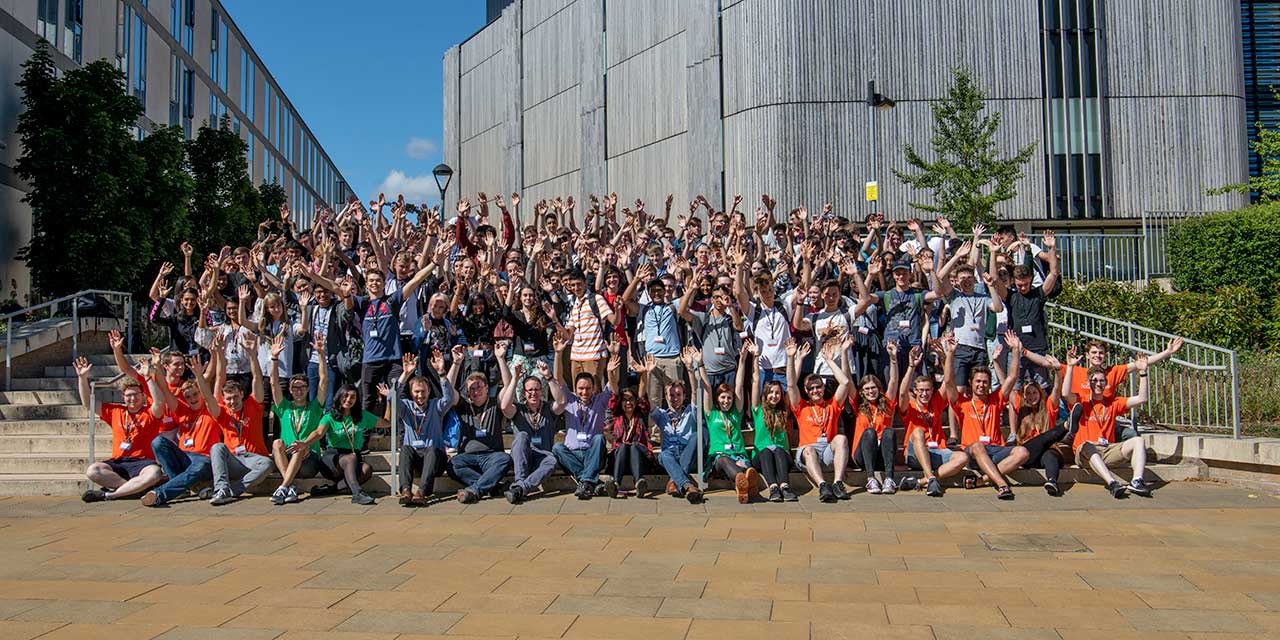
"Really worthwhile and helped me know that I wanted to do electronics at uni"
Our popular Summer Taster Courses in Electronics and Computer Science have been running successfully for many years. Since we started them in 2014, they have brought over 700 A-Level students to the university for a week long residential experience. They are a great way for students to find out more about subjects which are the cutting edge of technology and to explore whether the sector is right for them. Students get to:
- Try their hand at real experiments in our state-of-the-art laboratories
- Learn about our teaching and research from our globally renowned lecturers
- Get to know our current students and recent graduates
- Enjoy social events and meet fellow students
- Experience life on campus and in our halls of residence
- Meet leading employers at our annual Taster Course Careers Fair.
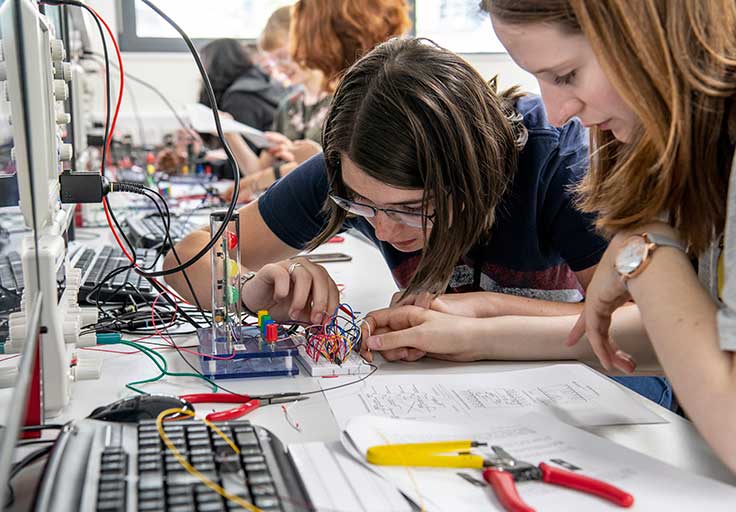
No previous experience of electronics, computer science or programming is needed, as students have lots of supervision in our high-spec labs with outstanding facilities. However, students which already have good skills in these subjects get the opportunity to extend them and apply them to new problems.
The Electronics and Computer Science course, the technical programme for which is run by my colleagues Dr Alex Weddell and Dr Jonathon Hare, is designed for students who like maths, technology or science subjects at A-Level, to come and apply their skills to computer science and electronic engineering. Students get to work in groups, investigating and designing solutions to real-world problems in our state-of-the-art undergraduate labs.
The Biomedical Electronic Engineering Taster Course, the technical programme for which is run by my colleague Dr Daniel Spencer, lets students experience the cutting edge interface of electronics and healthcare technologies. Attendees are taught how to design and construct a miniature biosensor and analyse its performance by measuring samples representative of three different diseases. Students also learn about miniaturised "Lab-on-a-Chip" diagnostics, smart prosthetics and signal analysis techniques for wearable healthcare.
